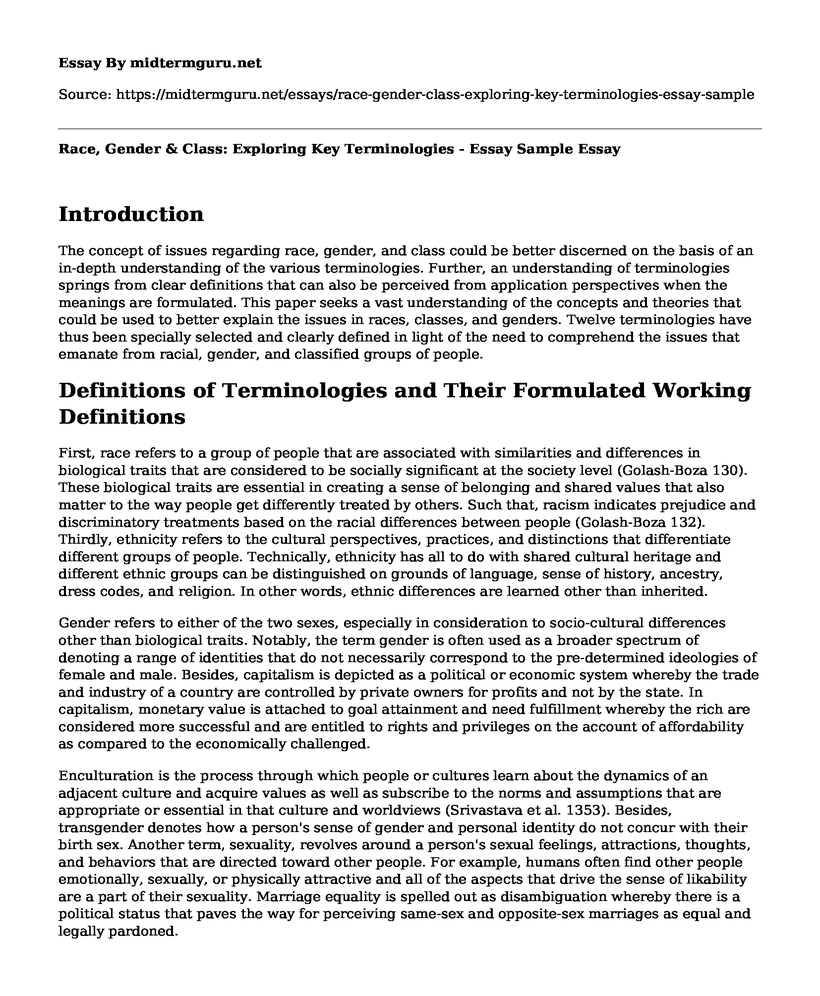Introduction
The concept of issues regarding race, gender, and class could be better discerned on the basis of an in-depth understanding of the various terminologies. Further, an understanding of terminologies springs from clear definitions that can also be perceived from application perspectives when the meanings are formulated. This paper seeks a vast understanding of the concepts and theories that could be used to better explain the issues in races, classes, and genders. Twelve terminologies have thus been specially selected and clearly defined in light of the need to comprehend the issues that emanate from racial, gender, and classified groups of people.
Definitions of Terminologies and Their Formulated Working Definitions
First, race refers to a group of people that are associated with similarities and differences in biological traits that are considered to be socially significant at the society level (Golash-Boza 130). These biological traits are essential in creating a sense of belonging and shared values that also matter to the way people get differently treated by others. Such that, racism indicates prejudice and discriminatory treatments based on the racial differences between people (Golash-Boza 132). Thirdly, ethnicity refers to the cultural perspectives, practices, and distinctions that differentiate different groups of people. Technically, ethnicity has all to do with shared cultural heritage and different ethnic groups can be distinguished on grounds of language, sense of history, ancestry, dress codes, and religion. In other words, ethnic differences are learned other than inherited.
Gender refers to either of the two sexes, especially in consideration to socio-cultural differences other than biological traits. Notably, the term gender is often used as a broader spectrum of denoting a range of identities that do not necessarily correspond to the pre-determined ideologies of female and male. Besides, capitalism is depicted as a political or economic system whereby the trade and industry of a country are controlled by private owners for profits and not by the state. In capitalism, monetary value is attached to goal attainment and need fulfillment whereby the rich are considered more successful and are entitled to rights and privileges on the account of affordability as compared to the economically challenged.
Enculturation is the process through which people or cultures learn about the dynamics of an adjacent culture and acquire values as well as subscribe to the norms and assumptions that are appropriate or essential in that culture and worldviews (Srivastava et al. 1353). Besides, transgender denotes how a person's sense of gender and personal identity do not concur with their birth sex. Another term, sexuality, revolves around a person's sexual feelings, attractions, thoughts, and behaviors that are directed toward other people. For example, humans often find other people emotionally, sexually, or physically attractive and all of the aspects that drive the sense of likability are a part of their sexuality. Marriage equality is spelled out as disambiguation whereby there is a political status that paves the way for perceiving same-sex and opposite-sex marriages as equal and legally pardoned.
Oppression relates to the long-term cruel or unjust treatment of the people in the name of authoritative exercises. For example, when authoritarian regimes control the ruled through a system of state control over monetary systems, politics, and the military leading to the denial of imperative civil or human rights. Human rights are the inherent requirements to all members of the human species regardless of their sex, race, ethnicity, religion, nationality, or language. Some of the human rights include the right to liberty, life, freedom of opinions and expressions, freedom from torture and slavery, and the right to education and work, among other privileges that are fit for all humans in the context.
Similarly, civil rights are a wide and significant set of rights and privileges that are meant for protecting individuals from unfair treatments. Such that civil rights are the indicative privileges that guarantee eligible citizens the access equitable treatment and freedom from discrimination in many settings such as public accommodations, employment, housing, and education as per the clear legally-protected traits.
Works Cited
Golash-Boza, Tanya. "A critical and comprehensive sociological theory of race and racism." Sociology of Race and Ethnicity 2.2 (2016): 129-141. Retrieved from: http://www.academia.edu/download/43216855/Sociology_of_Race_and_Ethnicity-2016-Golash-Boza-2332649216632242.pdf
Srivastava, Sameer B., et al. "Enculturation trajectories: Language, cultural adaptation, and individual outcomes in organizations." Management Science 64.3 (2017): 1348-1364. Retrieved from: https://cloudfront.escholarship.org/dist/prd/content/qt8qn146c5/qt8qn146c5.pdf
Cite this page
Race, Gender & Class: Exploring Key Terminologies - Essay Sample. (2023, Jan 26). Retrieved from https://midtermguru.com/essays/race-gender-class-exploring-key-terminologies-essay-sample
If you are the original author of this essay and no longer wish to have it published on the midtermguru.com website, please click below to request its removal:
- Essay Sample: Armed Thief Case Description
- The Role of Literature in Changing Society - Essay Example
- Elements of Refined Communication - Critical Essay
- Arranged Marriages in India: Pros & Cons in 21st Century - Essay Sample
- Creating an Effective Communication Plan: Analyzing Old Practices & Strategies - Research Paper
- Healthcare: Right or Privilege? - Research Paper
- Drug & Substance Abuse: Examining Homelessness & Its Impact - Essay Sample







